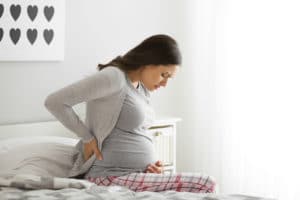Hypermenorrhea – What is it really? Menstruation is not a particularly pleasant time of the month for most women. It’s not a good time to be menstruating, you’re constantly having to run to the toilet, you’re plagued by cramps or abdominal cramps and you’re often in a bad mood.
If menstruation is also extremely heavy and accompanied by severe pain, this can significantly reduce the quality of life of those affected. The term ‘hypermenorrhoea’ refers to too profuse menstrual bleeding, resulting in the loss of more than 80 milliliters of blood in one cycle. Learn more here.
Table of contents
What Is Hypermenorrhea?
Typically, a woman has a menstrual period every 28 days. On average, she loses about 40 millilitres of blood. After four to five days, the menstrual cycle starts again. Women with hypermenorrhea lose twice as much blood during their menstruation, and often the bleeding lasts longer than normal.
This can not only be very annoying but also extremely stressful. Sometimes having to change tampons and pads more than six times a day, and sufferers sometimes even fear ‘leaking’ when they are out of the home.
In addition, heavy menstrual bleeding can be a cause of poor concentration and fatigue, as large amounts of iron are lost with menstrual blood.
If the symptoms cause severe anxiety, it is imperative to consult a gynecologist. Treatment options for hypermenorrhea range from medication and minor surgical interventions to curettage and hysterectomy.
Often, abnormal bleeding is due to organic causes, such as uterine fibroids, endometriosis or polyps. These conditions are usually easy to treat and in most cases menstrual cramps improve with treatment.
If treatment does not work, a hysterectomy may be considered as a last resort. However, hysterectomy should only be done when all other treatment options have been exhausted.
After a hysterectomy it is no longer possible to have children.
Menstrual Disorders – An Overview
So you don’t get confused with all the technical terms, here’s a brief overview of the most common menstrual disorders:
- Amenorrhea: menstruation stops completely for a period of several months.
- Hypomenorrhea: menstrual bleeding is too light.
- Hypermenorrhoea: the menstrual cycle is too profuse.
- Menorrhagia: Menstruation lasts too long, sometimes up to two weeks.
When Is Menstruation Considered Too Heavy?
By definition, by 80 milliliters of blood loss during the period. In individual cases, however, it is difficult to decide whether menstruation is still considered “normal” or already abnormal. After all, it is not possible to measure exactly how much blood a woman loses during menstruation.
However, there are some signs that may indicate excessive menstruation:
- Separation of larger clots of blood and tissue.
- Tampons or pads should be changed every two hours.
- Lower abdominal cramps.
- Circulation problems, weakness, fatigue.
- Severe pain (dysmenorrhea).
Note: The above symptoms must occur regularly to be considered pathological. It can always happen that bleeding is heavier and more painful than usual during a month. As a rule, however, it is not diseases that lie behind it, but other causes. So your worries are usually unfounded.
What Are The Causes Of Hypermenorrhea?
Hypermenorrhea usually has organic causes, i.e. diseases or changes in the tissues. These diseases usually affect the reproductive organs, but other diseases can also be the cause of heavy bleeding.
However, hypermenorrhea is not necessarily caused organically. Stress and psychological tension can also affect the body and intensify menstrual bleeding. Below is an overview of the most common causes.
Fibroids: Benign Muscle Growths In The Uterus
Fibroids are benign growths in the muscle layer of the uterus. It is not yet known what causes this uncontrollable growth. If the fibroids are at a disadvantage or are particularly large, they may prevent the uterus from contracting.
During menstruation, the muscles of the uterus contract to expel the lining of the uterus and prepare it for a new cycle.
If the uterus cannot push the lining away properly as the fibroids interfere with contractions, this can lead to heavier and prolonged bleeding. Women who have completed family planning are often advised to have a hysterectomy (removal of the uterus) if they have many or very large fibroids.
Polyps: Benign Growths In The Lining Of The Uterus
Polyps are also benign growths, but they do not grow in the muscle layer like fibroids, but on the lining of the uterus. If polyps are particularly large, they can cause heavy bleeding and pain. In this case, it is advisable to remove. Polyps can be removed during a minor outpatient procedure.
Endometriosis: Growth Of The Lining Of The Uterus
The inside of the uterus is covered with a lining called the endometrium. Endometriosis occurs when the lining of the uterus spreads into the abdomen and also grows on the outside of the uterus and on neighbouring organs.
The ovaries and fallopian tube are often affected. Like the “normal” uterine lining, endometriosis lesions also bleed during menstruation. This leads to increased menstrual bleeding, which is often accompanied by severe pain.
Inflammation Of The Tubes
Tubal inflammation is usually caused by infection with bacteria, often chlamydia or gonococci. It can be acute or chronic and often causes irregularity and pain during menstruation. Usually, fallopian tube inflammation can be treated well with medication.
Hormonal Disorders
Many menstrual disorders have hormonal causes. There is often what is called luteal weakness, in which the corpus luteum does not produce enough progesterone during the second half of the cycle. Progesterone is used to prepare the lining of the uterus for implantation of the fertilised egg.
If the corpus luteum does not produce enough progesterone, the lining cannot build up properly. As a result, the second half of the cycle is often shortened, and bleeding is heavier and prolonged.
In addition, luteal insufficiency often causes infertility.
Cancer Of The Uterus (Uterine Carcinoma)
In very rare cases, hypermenorrhoea can be caused by a serious disease, for example uterine cancer. Uterine cancer is a malignant tumour in the uterus. It can develop from growths on the lining, such as polyps. Heavy bleeding and bleeding between periods are often the first signs of this form of cancer.
However, if diagnosed and treated early, the chances of recovery are very good. In most cases, a total hysterectomy is performed in which the patient has not only the uterus removed, but also the fallopian tubes and ovaries. This is the only way to completely remove the tumor and cure the disease.
Especially in young women, it may happen so that no organic cause of profuse menstruation is found. In this case, hypermenorrhea is unpleasant, but harmless.
As long as you do not notice sudden changes or other symptoms, there are probably no pathological causes for the increased bleeding. Most diseases of the uterus cause many different symptoms that usually occur together.
Possible Consequences Of Hypermenorrhoea
Excessive blood loss can lead to temporary anemia. This is because large amounts of iron are also lost through the blood. However, this mineral is necessary for the formation of red blood cells in the bone marrow.
They are responsible for supplying the body’s organs with oxygen. If not enough red blood cells can be formed due to iron deficiency, the cells are supplied with less oxygen. This is also called anaemia or anaemia. Common signs of anemia are fatigue and weakness.
How Does The Doctor Diagnose Hypermenorrhea?
Hypermenorrhea is diagnosed when there is a loss of more than 80 ml of blood during menstruation. It cannot be measured accurately, but can be estimated fairly well based on the information provided by the patient. Therefore, when you go to a gynecologist because of heavy bleeding, he will ask you a few questions about your menstruation.
For example, how often do you need to change tampons or pads during menstruation. It’s best to record these things in a diary a few months in advance. This is the best way for the gynaecologist to assess whether you have hypermenorrhoea or not.
With the help of an ultrasound scan, he can see if there is any inflammation or changes in the uterus. In some cases, a hysterectomy is recommended. If you have symptoms such as dizziness or weakness, you should also have a blood test. This can check for anaemia.
Note: It can happen to any woman that the bleeding is particularly heavy. So you don’t need to worry if your period is a little heavier than usual.
There are many other factors, such as stress and diet, that can affect your menstruation and cause irregularity from time to time.
How Hypermenorrhea Is Treated
Hypermenorrhea is not a disease per se, but a symptom. So, to get rid of hypermenorrhea, you need to treat the underlying disease. Depending on the cause, different treatment measures are used.
In the case of fibroids or polyps in the uterus, surgical removal of these tumors can bring relief. Although benign, they can cause severe discomfort depending on their size and location.
If the cause of menstrual problems are hormonal disorders, hormone therapy is recommended in many cases. Often, the doctor also prescribes birth control pills, which help balance estrogen and progesterone levels.
However, if at some point the desire for pregnancy appears, the intake of tablets should be discontinued. In particularly severe cases of hypermenorrhoea, uterine curettage may also be considered.
This involves removing the lining of the uterus with special instruments, such as a laser or suction cup. After this procedure, menstruation stops for good and it is no longer possible to have children. Therefore, curettage or even hysterectomy should only be a last resort.
If you are considering treatment for hypermenorrhea, you should first familiarize yourself with the advantages and disadvantages of all treatment options and weigh them against each other. Your gynaecologist can help you make an informed decision.
Which treatment is right for you also depends on whether or not you still want to have children. For example, if your uterus has been removed, this is no longer possible. Many women also try painkillers or special medicines that first weaken the bleeding.
Hysterectomy – When A Hysterectomy Is A Last Resort
In the past, heavy menstrual bleeding was often treated with a hysterectomy. This procedure is the only one that guarantees one hundred percent success. Logically – after a hysterectomy the uterus can no longer cause problems.
Today, however, this procedure is usually only applied in cases of great suffering and severely limited quality of life for those affected. In a hysterectomy, the uterus is removed either completely or only partially. In both cases, however, it is no longer possible to become pregnant after the operation.
Hysterectomy should therefore only be carried out if alternative therapeutic measures have not been successful or if the family planning of the person concerned has been definitively completed.
In some cases, however, a hysterectomy is the only solution, for example if the person has uterine cancer. In this case, a hysterectomy is absolutely necessary to cure the disease.
In any case, before making a decision, you should inform yourself in detail about all treatment options. Hysterectomy should always be a last resort, as it is a very serious operation that cannot be reversed later.
Sources
https://www.gesundheitsinformation.de/starke-regelblutung.2133.de.html
http://www.myom-wissen.de/zyklus-und-gebaermutter/menstruationsbeschwerden/











